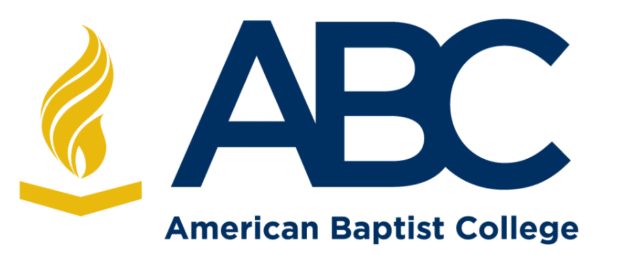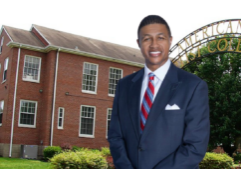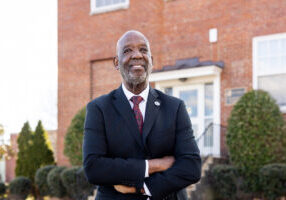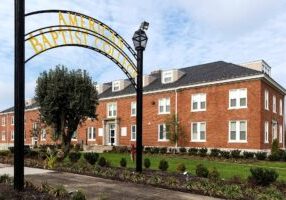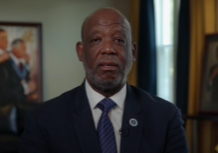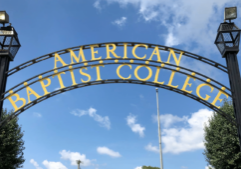Many, if not all of us are having emotional, physical and spiritual difficulty handling disruptions of the COVID-19 pandemic. The normalcy of our daily lives has changed dramatically. It is a burden draining us every day of social distancing and accumulating reports of coronavirus deaths. While no infections of the virus are reported among the immediate ABC community, it was reported that a thirty-year alumnus pastor contracted the virus and died in New York.
None of us were sufficiently prepared for the effects this pandemic would have world-wide, and particularly upon the normal operations of American Baptist College and other universities and colleges throughout the nation and the world. Closing normal operations, ending the semester abruptly, sending students home to complete the semester in modalities of online e-learning, all within a short period of time, was a stressful process that placed upon the administration, employees, faculty, and students enormous burdens. I thank each of you for spirit and valor helping the college make major necessary adjustments and modifications in response to the pandemic.
We are not alone bearing the burdens of COVID-19. Christian Churches, Islamic Mosques, and Jewish Synagogues all, are enduring the burden of adjusting to not having in-person gatherings for worship. During this Holy Week and Easter season, I encourage you, in your own ritual and practice, while sheltering at home to worship. Praying together in the intimate space of your home is a spiritual act we can share with children, spouses and significant others. This is a time to make our homes living sanctuaries of faith where relationships grow in love for God and each other. The reality that we can worship in our homes is not lost upon the fact that the novel coronavirus pandemic forces us into tight emotional corners of anxiety and fear. It is not a sign of weakness that we admit we are afraid. While holding on to faith and hope, we can look our fears squarely in the face as this coronavirus illness is resulting in thousands of deaths.
Recognizing we are in such an unusual juxtaposition space between our vulnerability and needing help to make the right and righteous choices, not only for our individual faith but for others around us, we must find ways to deepen our faith for the choices we must make. We want to make the best choices on the side of faith and love, hope and caring, and trusting more deeply in God’s all-consuming love for the world.
At the risk of this statement becoming too lengthy, I am extending my comments to talk about God’s all-consuming love in the context of the inevitable choices we must make in response to this global COVID-19 pandemic. There is tension in our faith, making life’s choices difficult. However, the Holy Week and Easter remembrance of Jesus can give us hope, resurrection faith for facing this unprecedented global pandemic.
You will recall how the gospel accounts give a glimpse of Jesus wrestling with the choice to go to Jerusalem knowing the brutal death he would suffer there. Going to Jerusalem was the choice Jesus made. Options were before him. Destiny may have pushed Jesus toward Jerusalem, but going was his choice. The inevitability of choice tracked Jesus down to a deep resolve. It was what the German word zeitgeist means; being tracked down by the accumulation of history and truth.
Jesus knew the back story of Jerusalem. It was once an exile city under Babylonian restraint and imperial power. He knew the ancient analog of
Jewish sorrow songs sitting by the rivers of Babylon weeping when they remembered the grandeur of Zion’s Temple mount brought to dusk and ruin. They’ve survived defeats, exiles, attempts of genocide and wars, all this history building Jesus’ zeitgeist moment. By the time Jesus matures in this Jewish history, the people are again under another form of imperial power, Rome’s dehumanizing oppression. They too are on the inevitable path of choice, forcing a small Jewish colony to either choose the weightier moral vision of justice, love and mercy or being complicit with Rome’s false constructs and military maintenance of peace. While systems and structures of oppression conspired to perpetuate chaos and oppression against them, Jerusalem’s own complicity contributed to its power and maintenance.
The inevitability of choice turns Jesus to a final uncompromising decision. “When the days drew near for him to be taken up, he set his face to go to Jerusalem.” When the time was coming near for Jesus to depart, he was determined to go, [resolutely] set out for, set his face toward Jerusalem (Luke 9:51). He could have chosen options of evasion to avoid the dangerous plot and conspiracy of Caiaphas and Pilate to kill him. Turning back to the haven of Nazareth was an option. He could send the disciples back to their families to safety, as guardians of their community. But the inevitability of choice, something larger than the fear of suffering turns Jesus to final resolve and decision. It was the all-consuming Kingdom vision of a new beginning that grasped him. God’s possibilities of divine power and reigning love for humanity were stamped with suffering in Jerusalem. He knew it but went on anyway.
At different stages of life, we all will have a zeitgeist moment. Owning our fears and vulnerabilities is not easy, however when the accumulation of history and truth tracks us down, we will confront choices that will bring new beginnings of flourishing and healing.
What this pandemic reveals about our choices may lead to insights for new beginnings. The dark side of disease does not shut out the light of hope for new beginnings in justice, compassionate and equitable distribution of resources.
This period might just be a liberation premier for new beginnings. Jesus will meet us on the path to face our own Jerusalem. I realize that Martin Luther King’s vision of a network of mutuality is a truth. Humanity is interrelated. We are interrelated: faculty and students, students and faculty, faculty and administration, the mission of American Baptist College interrelated to the healing of the world. It is our Jerusalem before us.
As president of our beloved college, I will be the first to admit that at times hidden fears that threaten the future of ABC are difficult to find courage to face. But in our near century of existence, God has been with American Baptist College and walked with us on the road to face the challenges of Jerusalem. ABC students faced the Jerusalem of the 1960s and became social justice change agents.
Now in this new century, we hold on to that same hope, that same steely resolve, that same faith to endure, as well as persevere as Jesus did in Jerusalem, and as we must do now.
Holy Week Message
The American Baptist College Family
By President Forrest E. Harris, Sr.
April 4, 2020
